#claudia turning out the way she did is the perfect evidence for why Aaravos should not be a father
Explore tagged Tumblr posts
Text
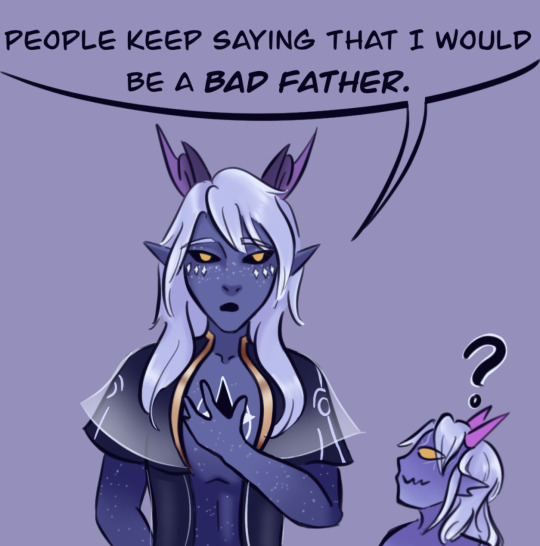
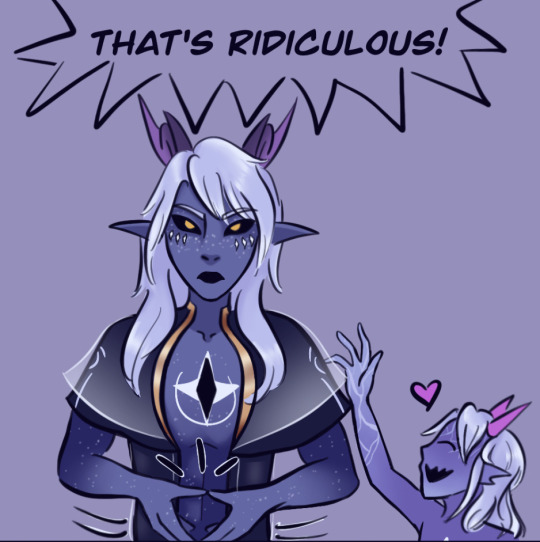
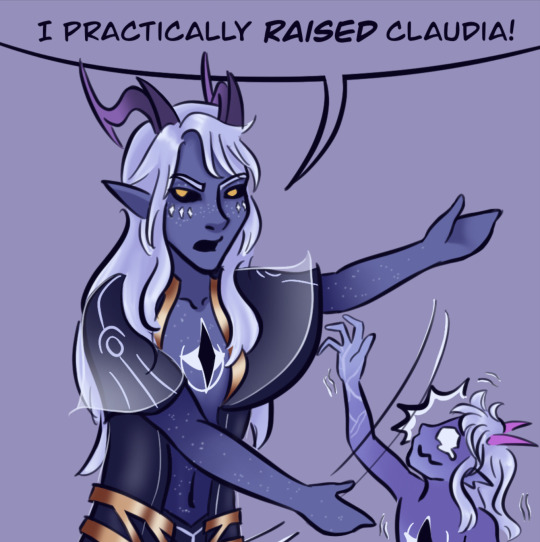
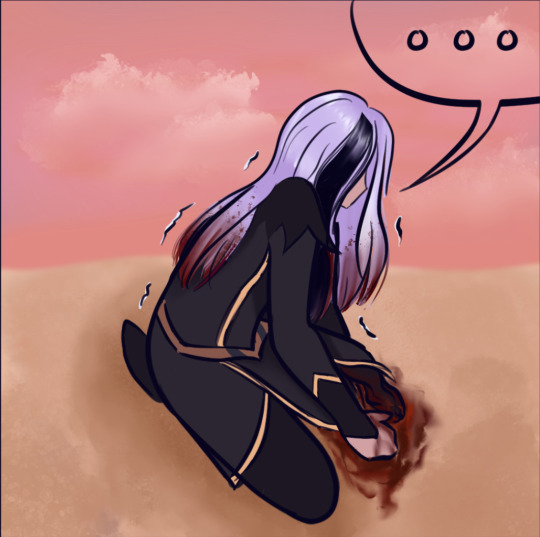
#aaravos#claudia#sir sparklepuff#my art#comic#the dragon prince#fallen stars#claudia turning out the way she did is the perfect evidence for why Aaravos should not be a father#aaravos parenting#sir puff just wants affection
252 notes
·
View notes
Text
Viren and His Children: A Game of Mirrors
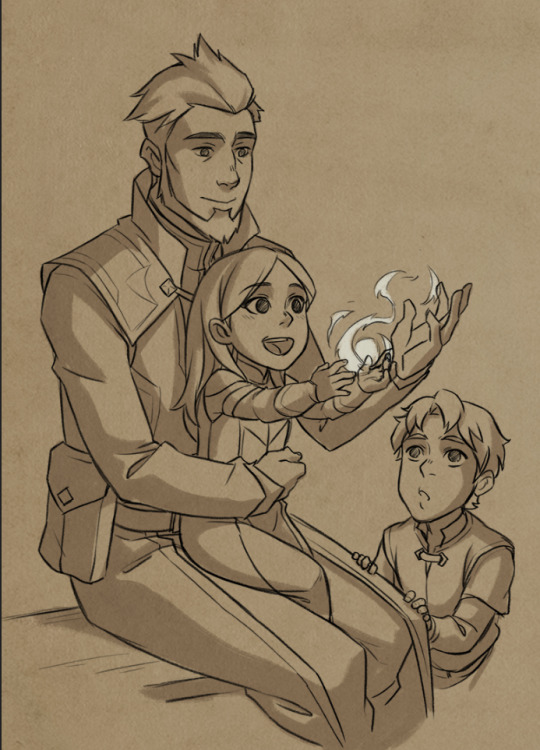
This picture shows the relationships between Viren and his two kids pretty nicely. On one hand there is Claudia using magic and Viren tenderly watching her. On the other hand there is Soren, who is not in his father’s lap, looking up at his sister and grabbing his father’s clothes to attract the man’s attention.
Viren treats both Soren and Claudia as extensions of himself, but he does so in different ways. There are two consequences to this. On one hand Soren and Claudia have developed different problems in relation to their parent. On the other hand they represent different sides of Viren himself.
This meta will try to show this and to show how Soren, Claudia and Viren all explore similar themes in different ways.
As a side note, when it comes to Soren and Viren, this meta by @mystic-deep has thoughts very similar to mine and it is a good read!
VIREN AND SOREN: THE TRUTH IN THE MIRROR
At the root of Viren’s character there is this:

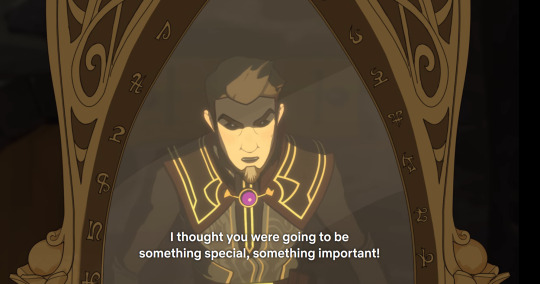
Here, Viren is talking about the magic mirror, but he is symbolically referring to himself. He wants to have power and to feel special. In other words, Viren’s thirst for power (aka his main flaw) is born by him deep down feeling worthless.
Viren projects this sense of worthlessness on both his children, so that they feel they have to gain their worth. After all, it is not by chance that by the age of respectively sixteen and eighteen Claudia and Soren are already accomplished enough to become the Archmage’s assistant and a Crownguard:
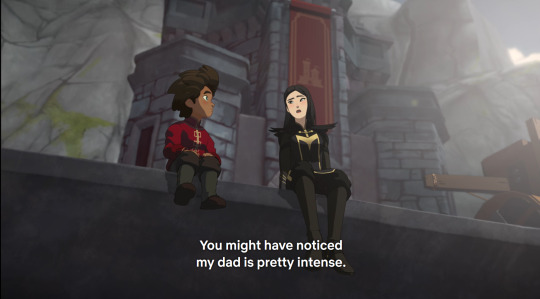
This becomes especially evident when you compare them with Ezran and Callum who, despite being princes, are not asked to do anything special with their lives. They are simply loved:
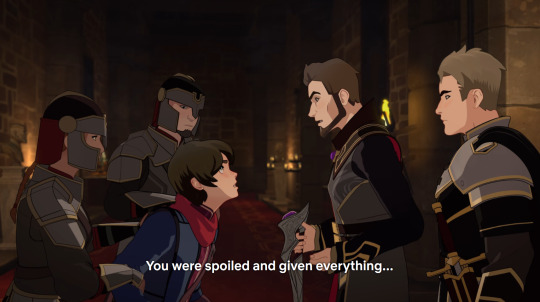
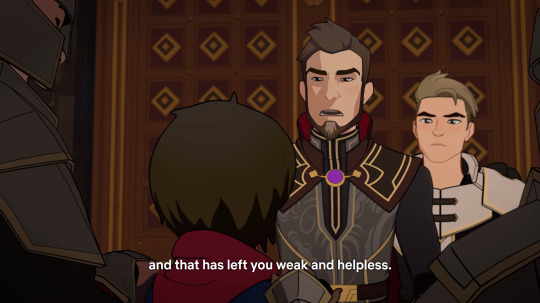

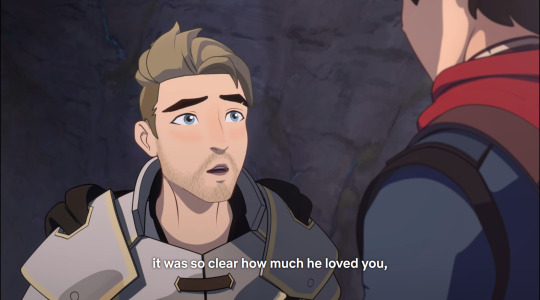
It is interesting that Viren and Soren say basically the same thing, respectively at the beginning and at the end of the first part of the series. However, they give the same concept opposite spins. As a matter of fact Viren presents the way Harrow brought Callum up as negative, while Soren presents it as positive. This is not by chance because Soren has inherited many of his father’s issues, but, differently from him, has managed to move past them by the end of season three.
This leads us to the main point of this section aka how Soren and Viren are similar and in what they differ.
First of all, both of them have sworn to protect the king since Viren is Harrow’s most trusted advisor, while Soren is a Crownguard. They both define themselves through their role and have pride in the abilities which let them reach their position. To be more specific, Viren is proud of his talent in dark magic and of his intelligence. Soren is instead proud of his physical prowess. In short, they share the same wish (proving their worth), but try to realize it in different ways (magical prowess vs physical prowess).
Viren and Soren are both ultimately examples of toxic masculinity, which can be defined as it follows:
-Suppressing emotions or masking distress
-Maintaining an appearance of hardness
-Violence as an indicator of power (think: “tough-guy” behavior)
(From the article I linked above, which @hamliet suggested to me).
These kinds of behaviours are very easy to spot when it comes to Soren:
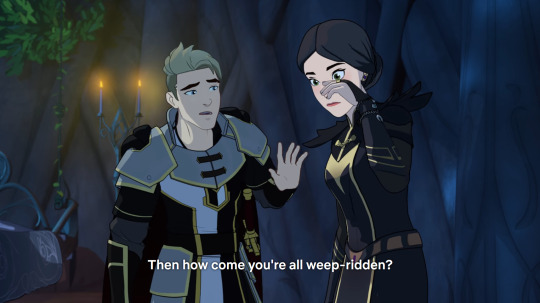

However, the story makes clear that Soren has developed them because of his father’s education:
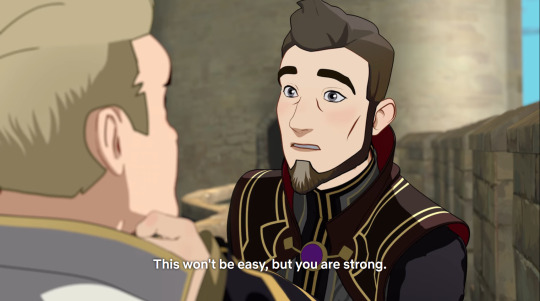
Toxic masculinity is at the root of the order Viren gives Soren. As a matter of fact he is asking his son to kill his childhood friends for some kind of greater good. Soren is asked to sacrifice his bonds and his feelings to impress his father. What is more, this sacrifice is presented as a way to prove his strength.
In other words, Soren tries to act as he thinks his father would want him to. This detrimental behaviour reaches its climax when Soren tries to kill Pyrrah. Let’s highlight that the episode Fire and Fury comes after The Heart of a Titan:
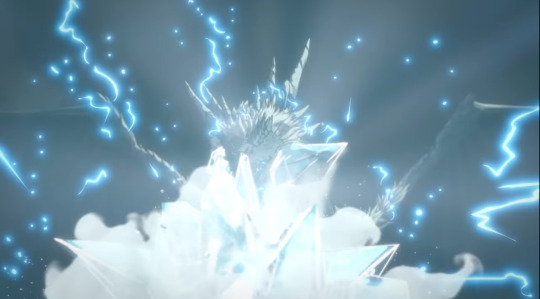
The Heart of a Titan
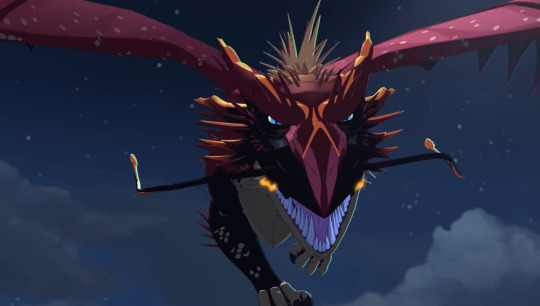
Fire and Fury
Both Viren and Soren’s fights against a dragon are masked as selfless attempts to help others. On one hand Viren goes back to try and help the Queens of Duren. On the other hand Soren claims that he wants to help the people of the city. However, both men are motivated by the need of proving themselves. Once again this is pretty evident when it comes to Soren:
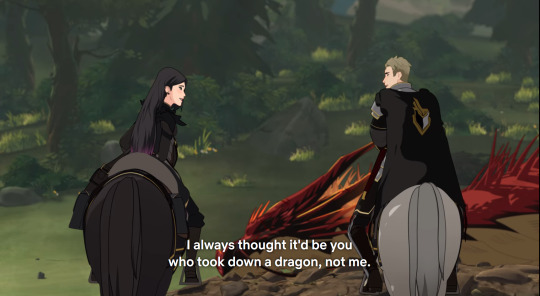

But even in this case Soren’s behaviour is born by specific teachings he received:


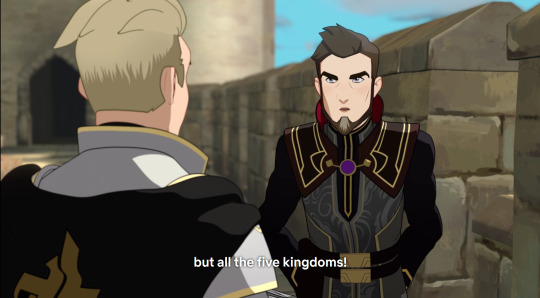
Viren is obsessed by the inferiority of humans when compared with magical creatures and thinks it is his duty to find a solution for it. What he does not notice is that he confuses humanity’s inferiority with his own inferiority complex. He does not want to win against magical creatures for humanity’s sake, but to show he is not inferior to them. In other words, Viren going back to fight Avizandum, when it was clear that he had no chance, was something probably born by his need to prove himself.
Things end up badly for both father and son. As a matter of fact the people they were trying to help suffer because of their interference. What is more, both Viren and Soren need to be saved by a woman who sacrifices (a part of) herself:


However, Soren receives an ulterior bad consequence for his behaviour:
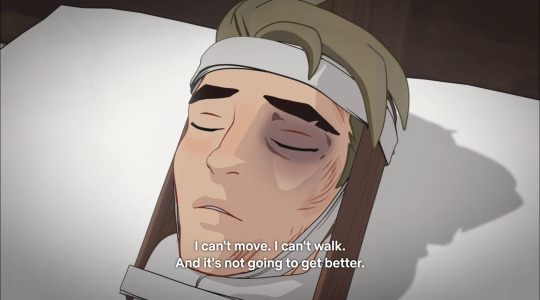
He temporary loses his physical strength aka the thing he was the most proud of. Because of this, he is forced to face his own vulnerability:

Opens up to his sister:

And expresses what he really wants:
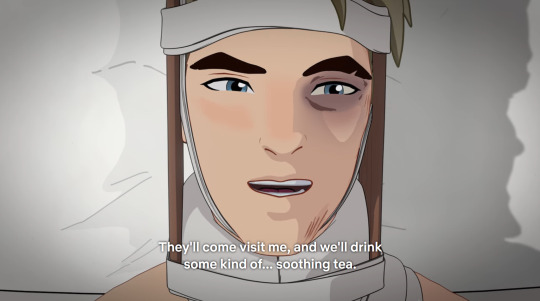
Ultimately what Soren wants is to love people and to be loved in return. Because of this, it is important that he is saved because of others’ love and kindness:


Claudia is there for him despite him having done a mess and Ezran forgives his crimes. It is ultimately because of them and of his own ability to learn from his mistakes that Soren is able to grow. It is poignant that in season 3 Soren starts to pursue his objectives with a completely different method from this:

He uses intelligence:

Communication:

And shows vulnerability, even to his father:
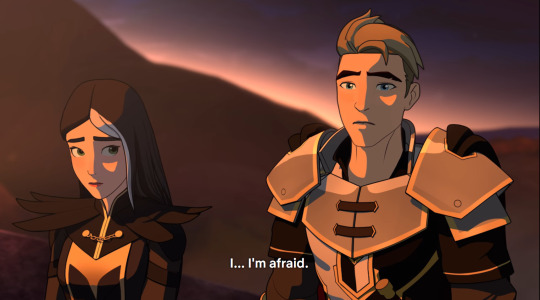
The fact that Viren, in this scene, despises his son’s vulnerability is symbolic of how he can’t really accept his own. As a matter of fact Viren basically does to Soren what he does to himself:

He asks Soren to cut his ties with his childhood friends, just like he did with Harrow whose children he is trying to kill. He wants Soren to inherit the throne, just like he is usurping it. He wants to turn Soren in a monster, just like he himself is turning more and more into one (both internally and externally):
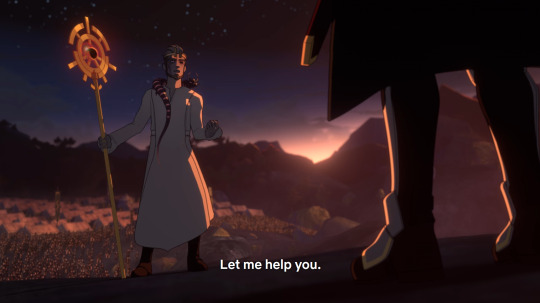
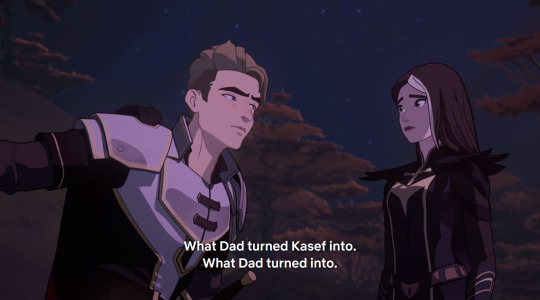
Because of all of this, the reason why Viren treats Soren so coldly finally becomes clear. It is because Viren sees in Soren a part of himself he is ashamed of and does not want to face. Soren is, in Viren’s eyes, the part of himself who tries hard, but never fully succeeds. So Viren asks of Soren the impossible and he shows Soren his most cruel and pragmatic side more openly than he does with Claudia. Moreover he tries to change Soren into someone(-thing) he sees as powerful. However, by refusing to accept his son for who he is, Viren misses that there is much to be loved about Soren. He misses that Soren has talents and traits, which make him a good person and a great Crownguard:
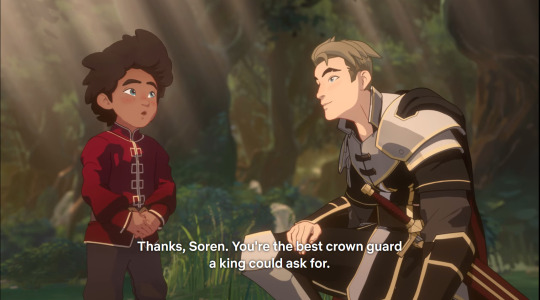
What is more, by refusing Soren’s doubts and challenges, he also refuses to see what should be clear:
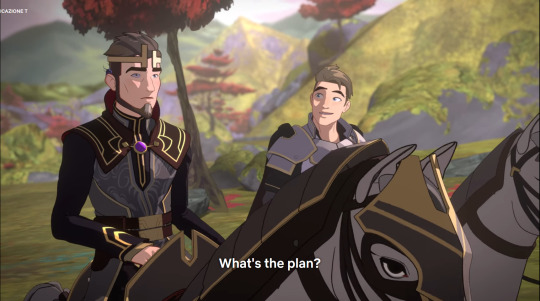
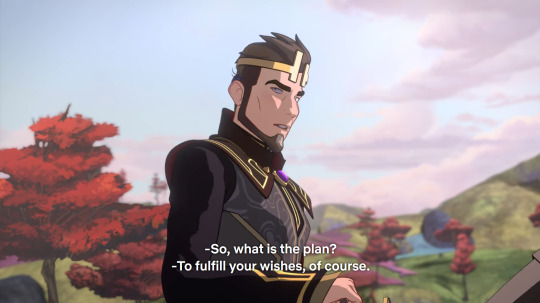
If Viren had listened to Soren’s question and had been honest with himself, he could have realized that he is not really the one in control, but that Aaravos is. Soren refuses to stay his father’s puppet, just when his father chooses to be someone else’s and stops thinking with his own head.
In conclusion, Soren is the victim of his father’s self-hate. Moreover, he symbolizes a part of Viren the man refuses. It is precisely because of this refusal that Viren spirals further and this spiral is symbolized by him becoming more and more intertwined with Dark Magic.
VIREN AND CLAUDIA: AN ILLUSION IN THE MIRROR
Dark Magic is described in this way by Sarai:


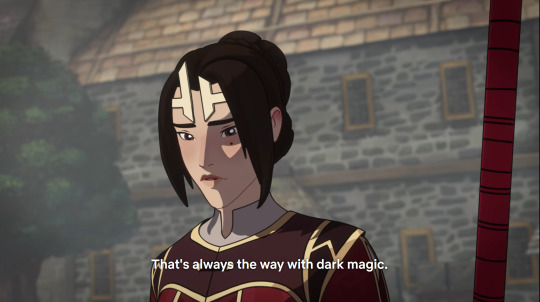
It is a shortcut which lets people evade problems. However, because of this, the issues which created the problems in the first place are never fully addressed. This leads to people being unable to grow because they never face their own shortcomings. In this way, they are given a sense of false security which is detrimental in the long run.
This is what happens to both Viren and Claudia. In particular, Claudia makes it clear:
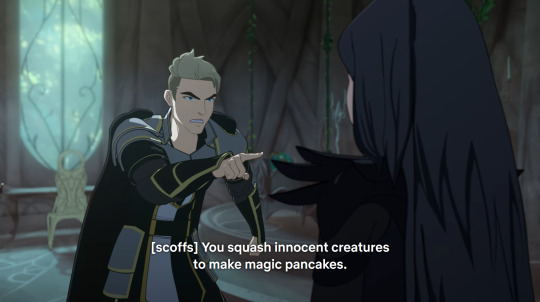
Claudia has grown so dependent on Dark Magic that she would use it even for making pancakes. Instead of simply cooking normally, she sacrifices small animals’ lives unnecessarily. This overdependence leads her to lose her usual nice demeanor when a situation she can’t fix with magic arises:


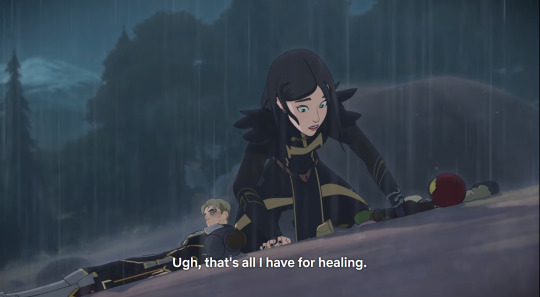

As in Soren’s case, she has become this way because of Viren’s teachings:
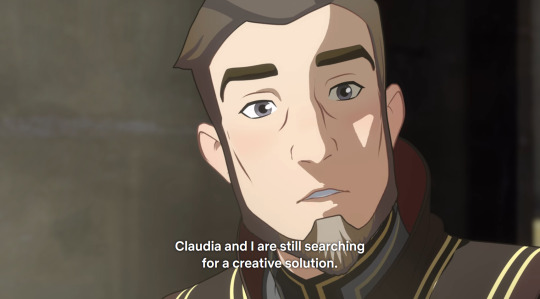
As a matter of fact both father and daughter share the method they use to reach their objectives. That said, Claudia’s internal motivation is different from her father’s. Viren is motivated by the wish to prove his strength. Claudia is instead motivated by the wish to stay together with her family. This is why she always justifies her loved ones’ actions. In this way, she does not have to enter in a serious conflict with them. In other words, she enables them even when she should call them out.
We have seen glimpses of this with Soren:



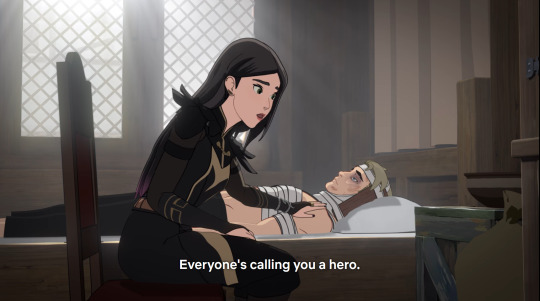
However, it is with Viren that this behaviour truly becomes toxic:
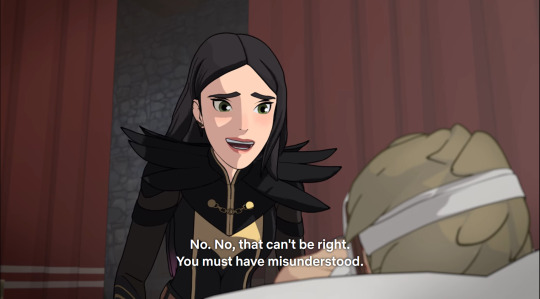
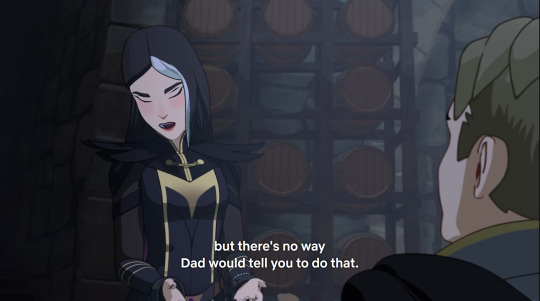
In the scenes above, it is clear that Claudia is tricking herself into believing Viren. She probably knows deep down that Soren has not misheard. However, it is easier to cling to the illusion that he did because in this way Claudia’s perfect little world does not shatter. In this world, her father is the best person ever and Soren is lovable, but a doof. Still, this world is an illusion and it will naturally disappear no matter how much Claudia tries to preserve it:
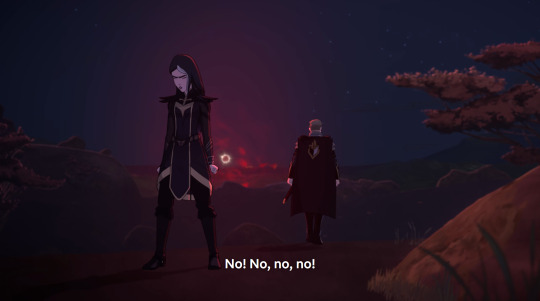
In the end Soren leaves and Claudia’s family loses another member. It is interesting that, in a sense, Claudia’s behaviour is the opposite of this:

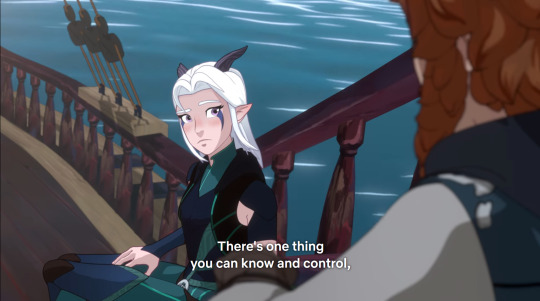
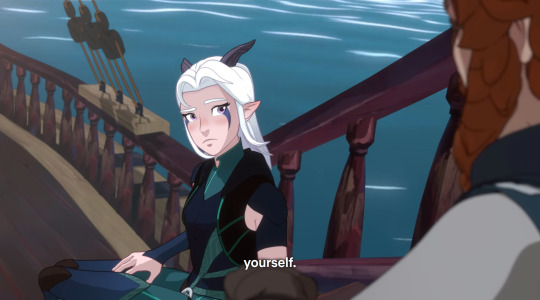
Villads tells Rayla she can control nothing, but herself. Claudia, though, is doing the opposite. She tries to control everything, but is really not able to control herself. By this, I mean that she is unable to actively make a choice:
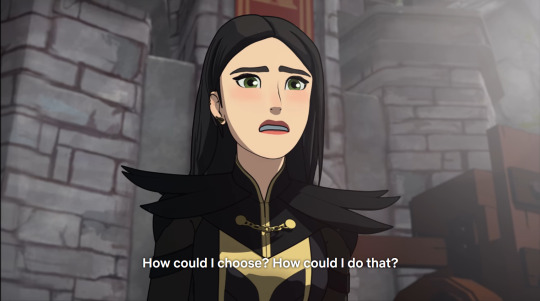
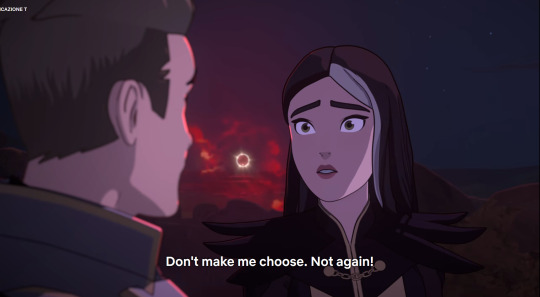
When it comes to her family, Claudia can’t choose. No matter that one side is clearly in the wrong, she still can’t bring herself to leave a family member. And this is why she is the one left behind instead. Let’s highlight that Claudia has stayed with Viren not because she has actively chosen him over her mother or even Soren. She has stayed with Viren because she could not make a choice and so her decision ended up being a passive one. Only at this point, Claudia would cling to what she has left and protect it with all her strength even if she must twist reality (both in her own mind and externally) to do so:
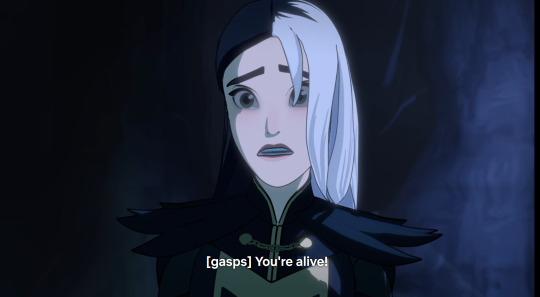
This behaviour is damaging both for herself and for her loved ones. As a matter of fact, by not calling her family out, Claudia is not able to stop their spirals. She helps Soren take out a dragon only for that dragon to wound her brother while he is mocking it.
Something similar happens with Viren as well:

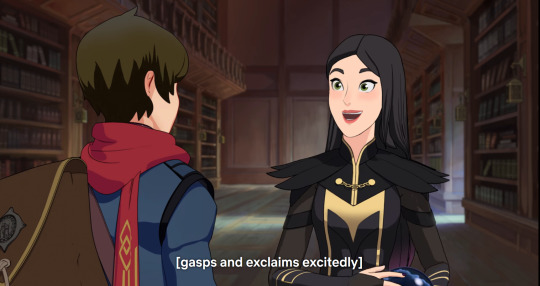
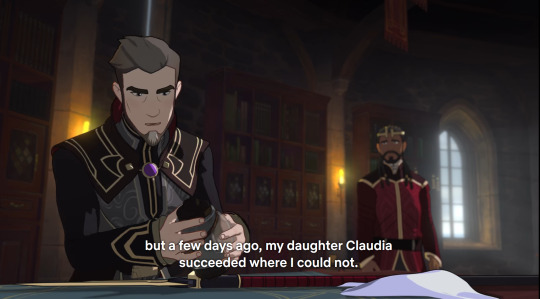

Since the very beginning, it is clear that Claudia’s talent for Dark Magic has enabled her father to perform more and more dangerous magic. Let’s highlight that Claudia is probably not really interested in her father’s objectives. She just wants to help Viren, but she only helps him to self-destruct himself more efficiently. If she had not given her father the corn, Viren and Harrow would not have killed Avizandum and all the terrible things which happened and will happen to her family could have been avoided.
Let’s underline that Claudia enabling her father is true not only from a practical point of view:
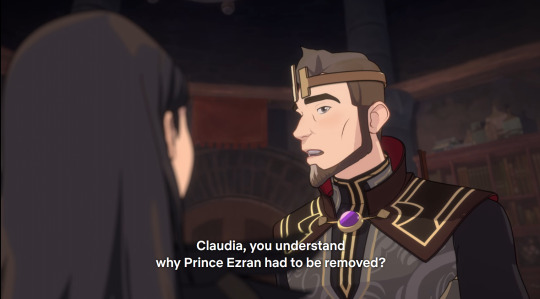

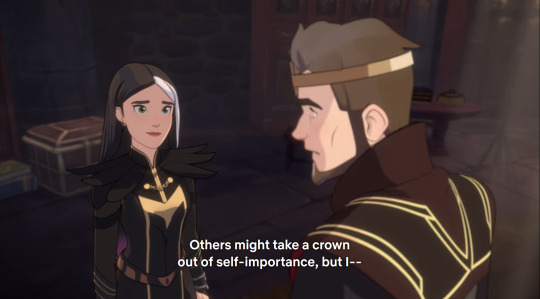
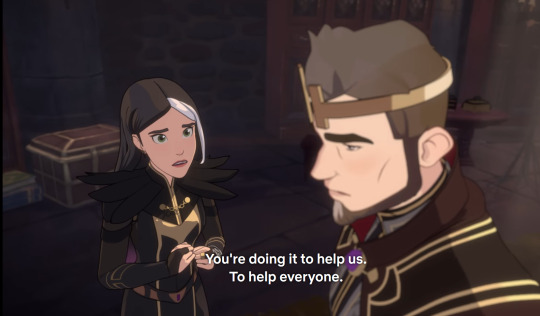
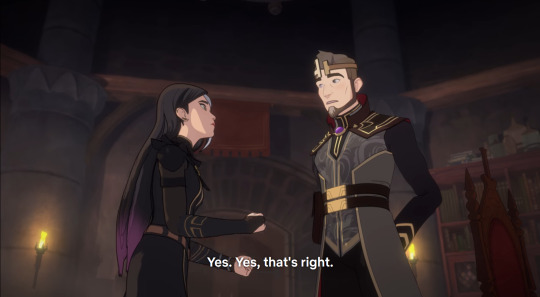
The scene above shows that Viren wants to be reassured and to be told that he has done the right thing. So he asks Claudia and Claudia readily tells him what he wants to hear. She knows what he wants to hear because it is what he himself has taught her. In short, Claudia acts as Viren’s echo chamber and repeats to him the same justifications he himself uses. In this way, they both manage to keep their respective illusions alive. They can both keep believing Viren is a good person, even if they deep down know it is not true.
This dynamic explains why Viren favors Claudia so much. He sees Claudia as a personification of everything he is proud of about himself. What is more, this personification looks at him as if he were the best person ever. So Viren sees through Claudia an image of himself he likes.
This is also why he hesitates to show Claudia his cruellest side:

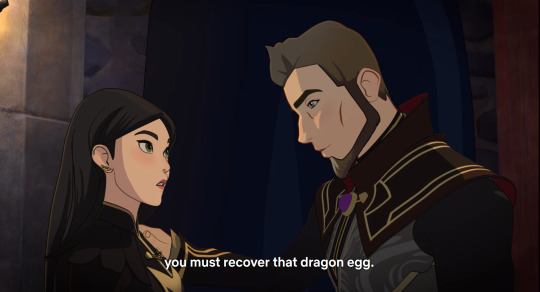
The mission Viren gives Claudia may be the one he cares the most about, but it is also the less cruel. Moreover he does not tell her to choose the egg over Soren initially, but he makes the addition after Claudia asks him. Even when one considers it, he is not asking Claudia to actively kill someone she cares about.
In conclusion, Claudia and Viren put each other on a pedestal and this is damaging for both. In particular, Viren uses Claudia to nurture his ego and to feel better about himself, while Claudia lets Viren go away with everything not to be abandoned. It is because Claudia refuses a conflict with her father that she can neither save herself nor him.
VIREN AND AARAVOS: BECOMING THE MIRROR
Soren and Claudia’s different relationships with Viren are conveyed through their respective reactions to Aaravos:
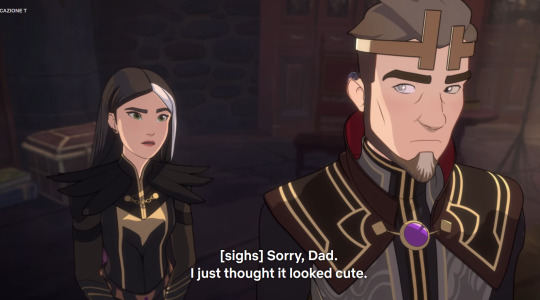
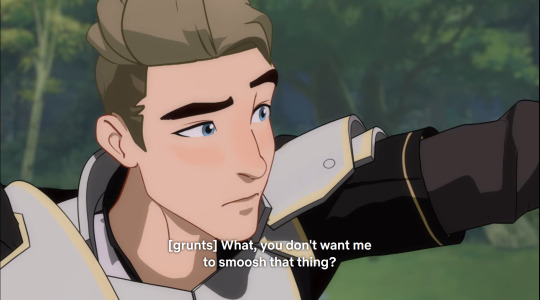
On one hand Claudia finds her father’s little bug pal cute. On the other hand Soren tries to smoosh it. This is not accidental, but symbolic. As a matter of fact Soren is who Viren is ashamed to be, while Claudia is who Viren is proud to be. Aaravos is instead who gives Viren the chance to truly become his ideal-self.
This is made clear since the very beginning:
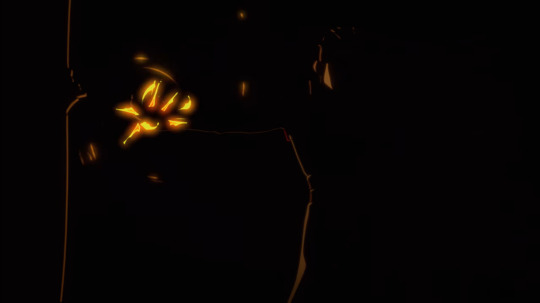



The first thing Aaravos does to communicate with Viren is to repeat the man’s actions. This is what a reflection should do, so Aaravos plays the part of Viren’s reflection. To be more precise, he offers Viren what he wants:

Because of this, Aaravos is seen by Viren as a chance to finally become who he wants to be. As a matter of fact it is clear that Viren idealizes Aaravos and ends up depending on him more and more. This is also shown through minor details:
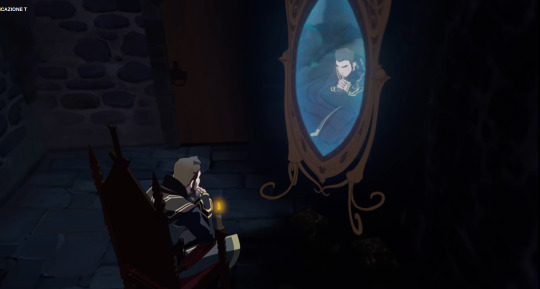

Viren glimpses into Aaravos’s room from his own one, which resembles a dungeon. The symbolism is clear: Viren feels trapped by his own limits and is given the possibility to see a better place and a person who may help him overcome said limits. However, this is an illusion:
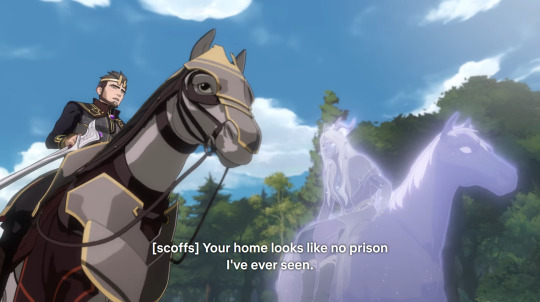
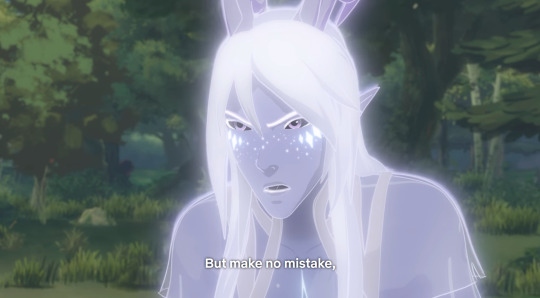

Aaravos’s luxurious room is nothing more than a prison. Similarly, the beautiful elf who offers to help Viren is not really Viren’s ideals encarnated, but, if anything, he is his worst instincts:
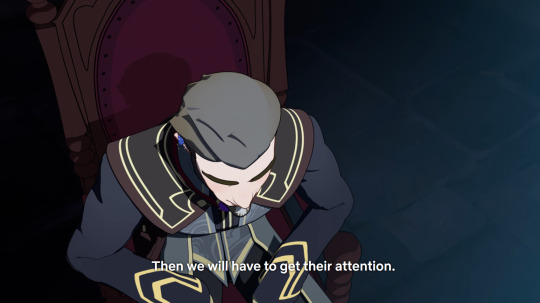
Aaravos pushes Viren to commit more atrocities than those he has already committed. What is more, the elf interferes in the relationship Viren has with his children:
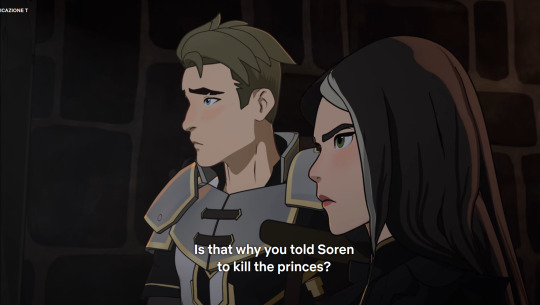
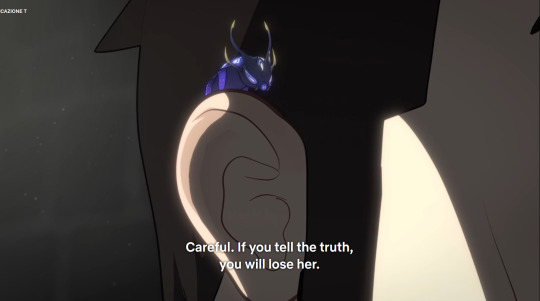
This is a pretty crucial moment. Claudia asks his father to explain himself and Viren is given the chance to come clean and to use this input to truly reflect on his own actions. However, any feeling of guilt or vulnerability Viren may be experiencing is readily suffocated by Aaravos’s words. The elf invites Viren to only think utilitaristically. So Viren manipulates both his children. In this way, he pushes Soren away and traps Claudia in a dynamic, which will damage her.
In a sense, Aaravos’s lines usually highlight Viren’s hypocrisy and his hidden contradictions:

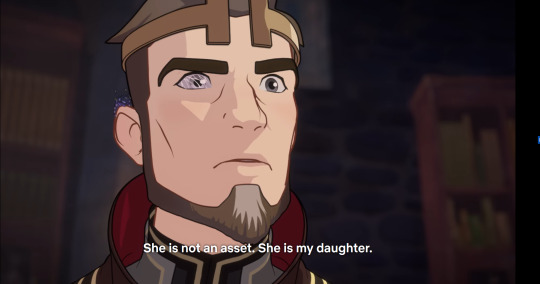
Viren refuses the idea that Claudia is just an asset, but ultimately this is how he treats both her and Soren. If that were not the case, he would have answered Claudia’s question in the dungeon honestly and would have apologized to both her and Soren. Aaravos simply makes clear something about Viren, which the man refuses. The same happens here:


Viren wants power for selfish reasons (he wants to feel worthy), but he deceives himself into thinking he wants it for others. This is why Aaravos’s words do not sit well with him. Your actions appear much less noble if you are reminded that what you really want is to conquer a nation.
At the same time, it is clear that Aaravos is not really in good faith and that he is using Viren’s insecurities to further his own agenda. This is why he is symbolically taking control of Viren:

Aaravos’s vessel is not the bug, but Viren himself. Aaravos is slowly taking him over. This is symbolically shown by Aaravos “stealing” Viren’s senses:


Moreover, by the end of season three, Aaravos is the one moving Viren’s body to hit Rayla:

In other words, it is not Viren controlling the mirror, but it is the mirror controlling him:
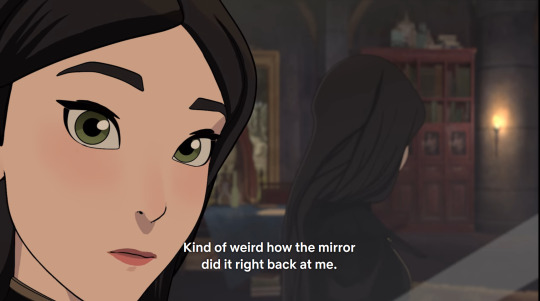
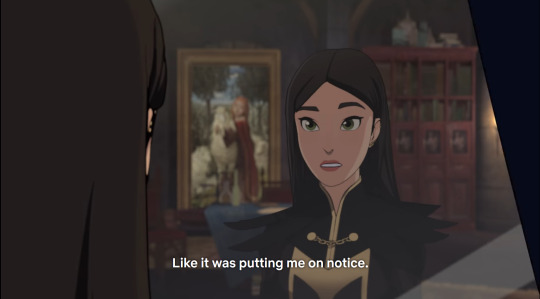
This is highly ironic. As a matter of fact, in his pursue of self-importance, Viren is being reduced to a shell through which Aaravos can act. However, Viren refuses to face this (as seen through his dynamic with Soren (shame)) and to admit his mistakes (as shown by his dynamic with Claudia (pride)).
CLAUDIA AND SOREN: MORE THAN REFLECTIONS
The analysis up until now has been focused on how Viren objectifies his two kids. He treats them as parts of himself, but they are more than that. This last section will highlight it through their relationship.
First of all, as stated in the first section, Soren and Claudia are very accomplished for their age. They are given adult responsibilities to the point that they are barely treated as kids by their parent:
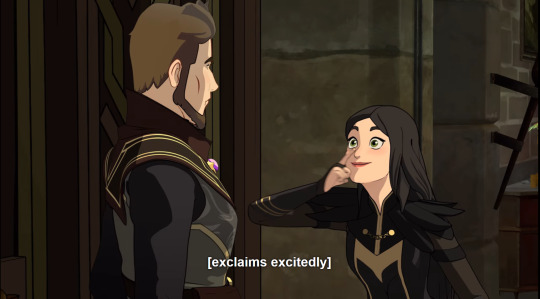
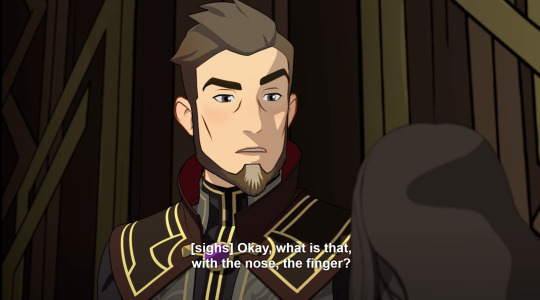
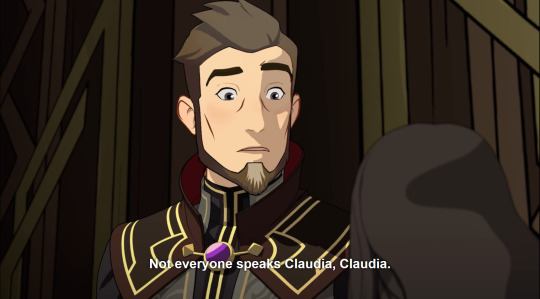


Viren has shown very little patience when it comes to the siblings’ most childish traits. He is annoyed by their jokes and dismisses their quirkiness as non-sense. This is very different from how the siblings treat each other:

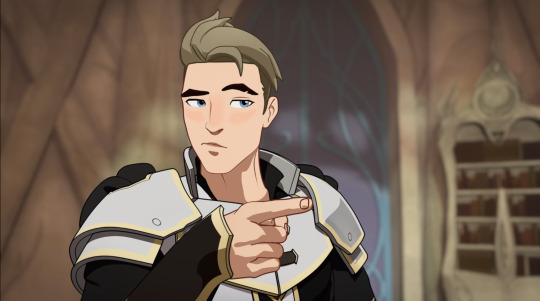

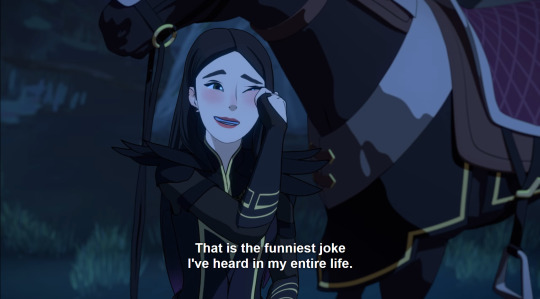
Soren and Claudia are able to express themselves more openly when they are together than when they interact with Viren. This is true also when it comes to calling each other out:
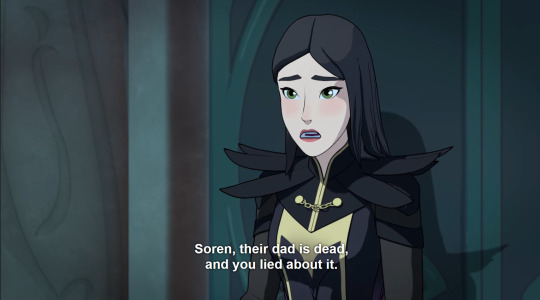
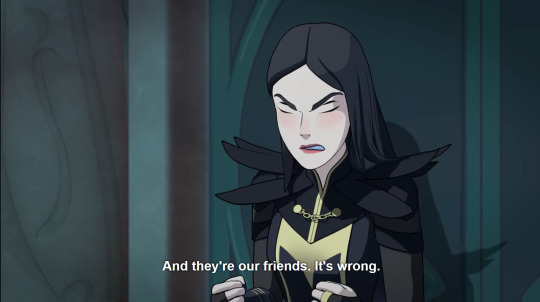
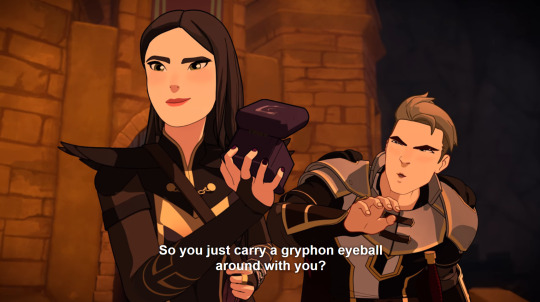

Interestingly, they criticize behaviours they share with Viren. As a matter of fact Claudia scolds Soren for his lack of tact and cruelty and ignores Viren’s mission is far crueller. Soren instead shows disgust for his sister’s magic, but does not dare to do the same to his father’s face.
This shows that, since the beginning, Soren and Claudia are uncomfortable with some traits Viren has. However, they tolerate them both in Viren and in each other out of respect for their parent. This is made clear throughout the series:
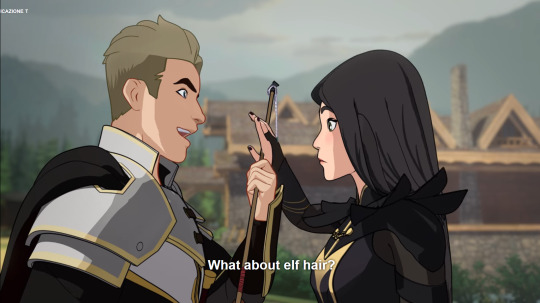
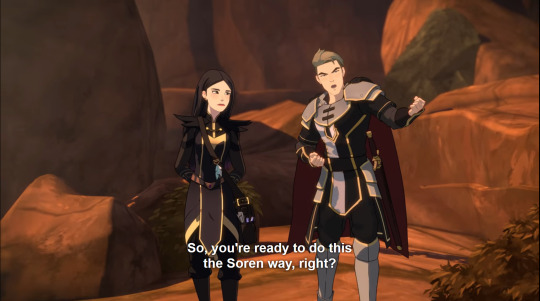
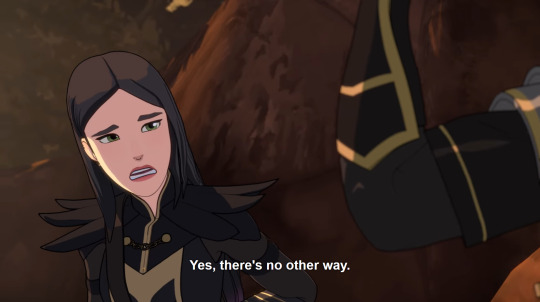
Soren finds magic gross, but finds ingredients for Claudia’s spell. Claudia does not want to fight her friends, but accepts to do it. The reason why they both compromise is clearly just one:
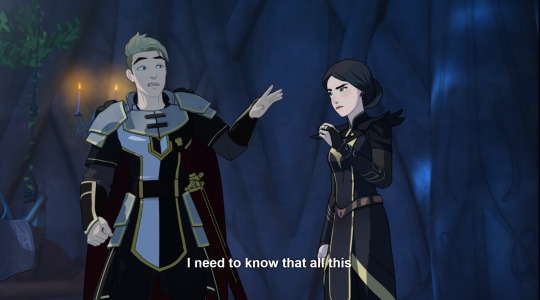
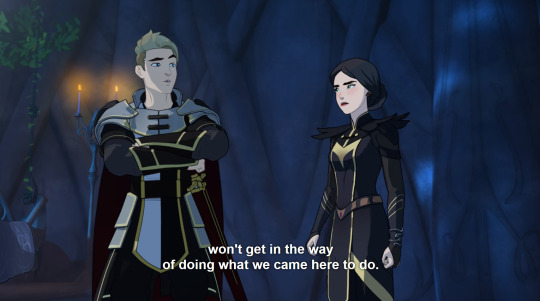
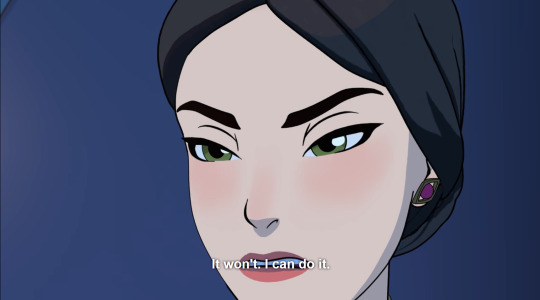
They must succeed in their mission. In other words, Viren’s presence, even when he is away, stops them from truly calling each other out and from acting in a way they both feel comfortable with. In a sense, it stops them from growing. Because of this, it is not a surprise that the first serious conflict they have is specifically about their father:

This scene portrays Soren and Claudia serving two different kings (Viren and Ezran). This highlights two differences between the siblings.
The first one is the dychotomy between duty and family/feelings. Given the choice, Soren always chooses his duty (Ezran):
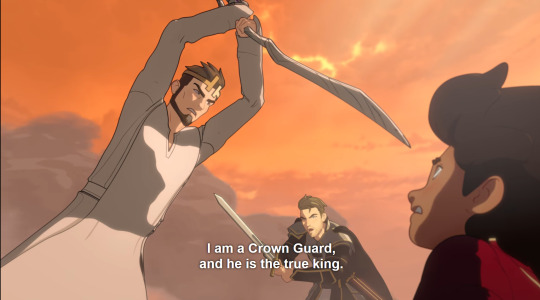

While Claudia always chooses her family (Viren):


Let’s underline that one choice is not inherently better than the other. This is made clear in season two. In this season, we see Soren choosing the mission over his childhood friends. This is his reasoning:

Surely, he wants to please his father, but he also wants to believe it is the best thing for the greater good.
In that same season, we see Claudia giving up on her mission:
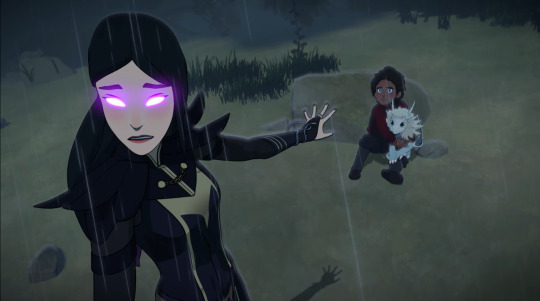
Claudia does so because her love for her family is superior to her sense of duty.
In other words, season two shows Soren making the wrong choice out of a misplaced sense of duty, while Claudia makes the right one by trusting her feelings. However, season three shows a reversed situation:
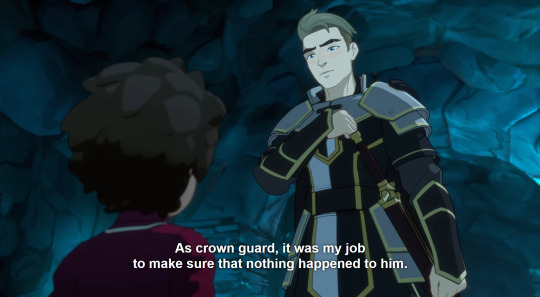
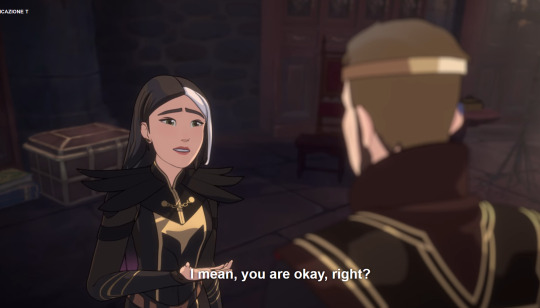
Soren is able to betray his father because of his own sense of duty, while Claudia can’t make herself leave Viren out of love.
In other words, the right choice does not lie neither in “relationships” nor in “duty”. After all, the lines between these two concepts are blurred. On one hand Soren reconciled with his childhood friends and forged new bonds in order to fulfill his duty. On the other hand Claudia would help Viren more if she called him out.
So, in the scene above, what is the true difference between the two siblings? Why is Soren in the right, while Claudia is in the wrong? The main difference lies symbolically in the fact that Soren is protecting a child, while Claudia is enabling a parent. This means that Soren is growing up, while Claudia is refusing to.
Growing up is a process, which often creates conflict between the child and the parent. This is especially true in this context because of Viren’s abusive behaviour. If the two siblings want to grow up, they must escape Viren and become their own people. This is what Soren has started to do in season three. Throughout the season he is able to see his father for who he really is, calls him out and finally leaves him to become who he wants to be.
This is something Claudia is not able to do because deep down she does not want to grow up. This is conveyed, as shown above, by her inability to choose. As a matter of fact Claudia does not want to choose, but to be chosen. This is because a choice implies a sacrifice (a consequence), but Claudia does not want to give up on anything precious to her. What she wants is, instead, that the people she loves always choose her. In this way, Claudia gives up her own agency.
This is clearly a consequence of her mother’s abandonment:
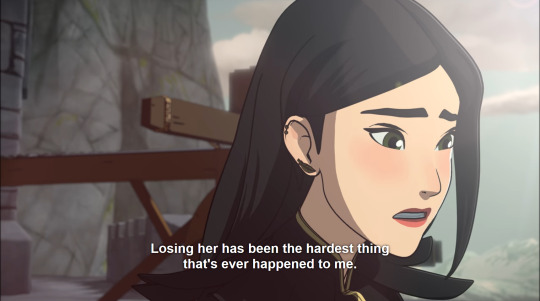
Because of this event, she is stuck in a childish state where she wants to be taken care of and protected. That said, her family members have other objectives, so she gives them what she herself wants (nurture and protection) hoping to receive it from them in return.
Let’s think once again about what Viren tells Callum at the beginning:
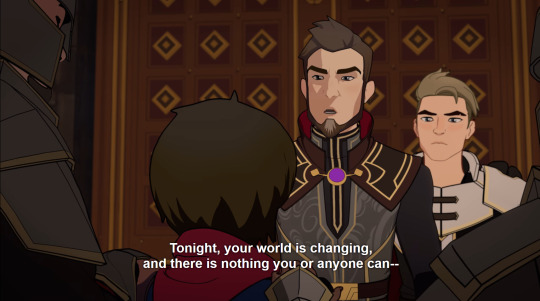
Viren claims that Callum (and Ezran) won’t be able to face changes because they have been spoilt. However, the narrative shows that this is not the case. If anything, the fact that Harrow has loved and supported his children is the reason why they can grow up:

Among the main characters, the one who can’t face change is Claudia and this is not because she has been spoilt, but because her mother made her feel unloved.
In short, both Soren and Claudia have developed a sense of worthlessness because of their parents’ behaviour. Soren has developed it because of Viren’s mistreatment, while Claudia has hers because of her mother’s abandonment. Soren tries to overcome his by impressing his fahter and later on he finds a healthier fulfillment in his role of Crownguard. Claudia tries to overcome hers by keeping her family together and toning down its conflicts. Soren defines himself through external recognizements, while Claudia through her relationships with others. All in all, it is the same problem, but it is declined in different ways.
In conclusion, Soren and Claudia are two kids who have been suffering because of their parents. In order to reach a positive outcome they must grow up and become independent (as proven by Soren in season three). In this way, they will naturally tone down some traits, which can be negative if taken to the extreme (love for one’s own strength, hate of conflict). It is probable that they will be able to do so through each other. After all, Soren got his chance to actively redeem himself because Claudia cured him, so it is likely Claudia too will be given another chance (hopefully) through Soren.
CONCLUSION: ESCAPING THE MIRROR
Both Viren and his children are all trapped in a game of mirrors. Viren treats his kids as reflections of himself and his pursue of an ideal self (who is nothing, but a mirage) is destroying his family.
To stop this process, Viren must accept who he is and his mistakes, while Soren and Claudia must claim their own individuality and become independent from their parent. There are several ways this can (or can’t) happen. I am curious about how the dynamics of this family will keep being explored in later seasons.
#tdp#tdp meta#tdp viren#lord viren#tdp claudia#tdp soren#claudia tdp#soren tdp#the dragon prince#the dragon prince meta#my meta#brodigies
96 notes
·
View notes